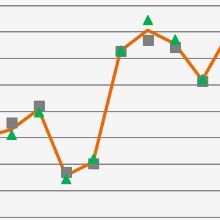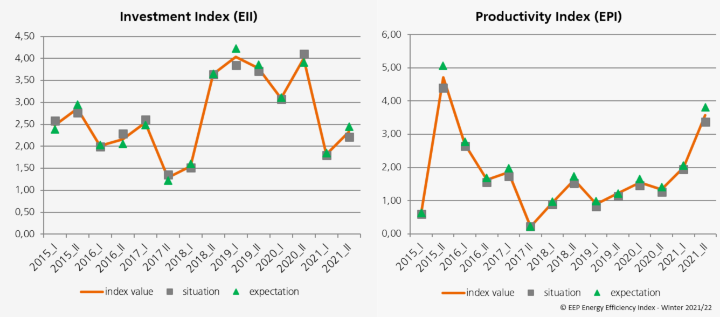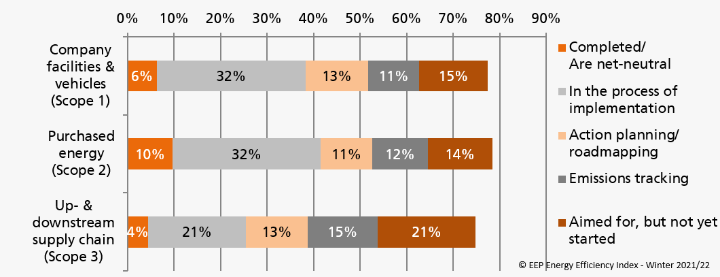The EEI winter survey 2021/22 shows significantly higher investments for efficiency measures after the sharp drop in the past half-year. Energy productivity has continued to increase rapidly. Overall, 70% of the companies surveyed want to offer their products in a climate-neutral way. The Institute for Energy Efficiency in Production EEP of the University of Stuttgart has been surveying current and planned measures as well as targets of German industry related to energy efficiency every six months since 2013. The EEI is compiled in cooperation with the German Energy Agency (dena), the Federation of German Industries (BDI), Fraunhofer IPA, TÜV Rheinland and other partners.
In total, almost 900 companies from over 25 sectors took part in the current EEI survey. "The current situation with rising energy and emission prices as well as the change in the federal government are apparently causing efforts to increase efficiency to rise again," says the head of the EEP, Professor Alexander Sauer.
A special focus in the current survey was on the areas (scopes) in which the companies want to save greenhouse gases: company facilities and -vehicles, purchased energy and all other emissions, including upstream and downstream supply chain.
Three quarters on track....
The share of those who are already working on the decarbonisation of energy sources they use is highest (78 %). "We are not surprised, because this is relatively easy to achieve by changing supply contracts," says Sauer. "But given the faltering expansion of renewables, there is a real risk that sufficient zero-emission energy will not be available on the market quickly enough, slowing down the decarbonisation of companies."
Decarbonising the emissions of the upstream and downstream supply chain, on the other hand, is particularly challenging because this is often largely beyond the direct control of companies. Nevertheless, the share of companies that intend to reduce these emissions is surprisingly high at 75%. However, the vast majority is still at the beginning of this process.
The majority of companies (66%) considers regulatory elements necessary to achieve the climate targets. Over 70% of those surveyed desire assistance in this regard. The Institute for Energy Efficiency in Production EEP has therefore created a platform with the new "Innovation Network Climate Neutral Companies" in cooperation with Fraunhofer to support manufacturing companies on this challenging path.
"Large parts of the manufacturing industry in Germany are intensively working on how they can contribute to a climate-neutral economy, but this requires setting the course on the part of policy-makers: planning times must be shortened, and emissions pricing must be standardised for more plannability. The support measures should be adapted to the different groups of actors. It is also important to reduce risks, i.e. ensuring the availability of energy, skilled labour, raw materials/materials at an affordable price. The planning or project planning costs in a field that is new to many companies must also be manageable so that we remain globally competitive," says Alexander Sauer.
| Contact | Dr. Birgit Spaeth, Press office, EEP – University of Stuttgart, Tel: +49 (711) 970-1810, E-Mail |
|---|
Expert Contact:
Dipl.-Volksw. Stefan M. Buettner, Project Manager Energy Efficiency Index, EEP – University of Stuttgart, Tel: +49 (711) 970-1156, E-Mail




